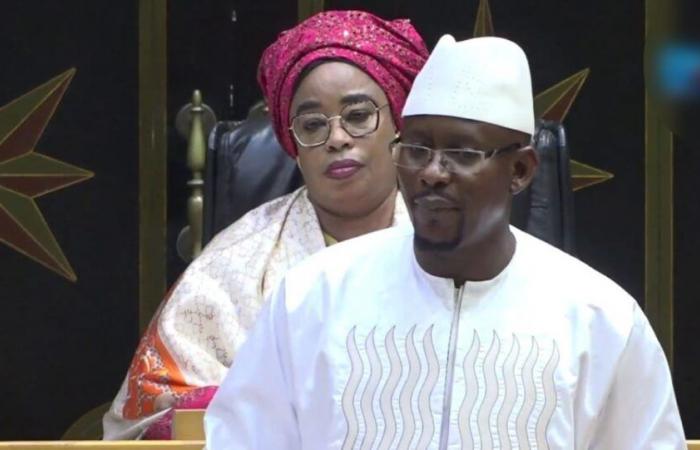Cited by the Treasury inspector, Tabaski Ngom, in a case of fraud involving 700 million CFA francs, could MP Moustapha Diop suffer the same fate as his colleague Farba Ngom? Elements of response.
At the heart of the financial scandal which involves Tabaski Ngom, Treasury inspector, and Mor Guèye, Managing Director of Sen Setal and Webcom Sen, floats the name of Moustapha Diop. At the origin of the media coverage of this case managed by the financial judicial pool, a complaint by Tabaski Ngom against the mayor of Louga and president of the Farlu coalition, for fraud involving 700 million CFA francs, for the financing needs of his electoral campaign during the last legislative elections.
The accounting officer of the Public Treasury, who had certainly sensed the imminence of his arrest, wanted to blame everything on Moustapha Diop. An outing which, according to L’Observateur, had the opposite effect since it precipitated his arrest. Already in the crosshairs of the Financial Prosecutor’s Office, following a complaint from the Energy Sector Regulatory Commission (CRSE) for an embezzlement of nearly 700 million CFA francs, the Treasury inspector tried to take the lead in avoid legal action.
Arrested by the Criminal Investigation Division (DIC) the day before yesterday, Thursday, she was subjected to a long interrogation on the instructions of the prosecutor of the Financial Prosecutor’s Office, El Hadji Alioune Abdoulaye Sylla, before being placed in police custody. According to L’Observateur, it is highly likely that she will be charged and placed under arrest for money laundering and fraud on public funds.
Arrested by the Saly Portudal Research Brigade, Mor Guèye, collaborator of Tabaski Ngom, also cited Moustapha Diop in this affair. According to him, Tabaski Ngom, far from being the victim she claims to be, would have given him checks so that he could deposit them, not in the accounts of the CRSE, but in those of his own companies, Sen Setal and Webcom Sen. L’Observateur reports that, pushing his argument further, Mor Guèye affirms that the total amount of the checks amounted to 681 million CFA francs, part of which (243 million) would have been intended for the deputy mayor Moustapha Diop for the financing of his electoral campaign during the 2024 legislative elections.
Moustapha Diop appears to be a key piece in this explosive financial scandal. With the prosecutor’s order to hear all people linked to this case, L’Observateur estimates that the mayor of Louga could be summoned very soon. However, unlike Tabaski Ngom and Mor Guèye, Moustapha Diop is a deputy and therefore benefits from parliamentary immunity. His summons would require a prior procedure, namely the lifting of this immunity, so that he can provide his part of the truth in this financial scandal.
-Parliamentary immunity in question
Will he have the same fate as MP Mouhamadou Ngom known as Farba, whose parliamentary immunity has already been lifted at the request of the courts? Théodore Monteil, a former deputy very familiar with parliamentary issues, recalled the provisions of the law in L’Observateur: “No deputy can be heard without the authorization of the Assembly. Whether as a witness or simple information. The prosecutor must not directly address a deputy without going through the authority of the National Assembly. »
However, he specifies: “The deputy (Moustapha Diop) can waive his inviolability. Immunity has two parts: he cannot renounce his irresponsibility, but he can renounce his inviolability and answer the prosecutor himself. » According to L’Observateur, in this case, the attorney general at the Court of Appeal can request the lifting of the parliamentary immunity of the deputy, and the minister transmits his letter to the National Assembly.
Does the Assembly need enough evidence, or simply accusations made by Tabaski Ngom, to lift Moustapha Diop’s parliamentary immunity? Théodore Monteil recalls that: “The Assembly does not need sufficient or insufficient elements. It only looks at three things: sincerity, loyalty and the seriousness of the request. The Assembly never decides on the substance, but only on the form. »
This reasoning, notes L’Observateur, perfectly matches that of Alioune Souaré, former deputy specializing in parliamentary issues. The latter emphasizes that: “Deputies are covered by their parliamentary immunity. No deputy may, during the duration of the session, be arrested or sought in criminal or correctional matters. » Alioune Souaré also recalls that acts, even committed outside the exercise of parliamentary functions, cannot exempt a deputy from immunity. However, it is possible for the deputy to waive this protection: “Crimes which have nothing to do with their work as a deputy in the exercise of their function can be judged if they waive it. »
According to L’Observateur, Moustapha Diop could demand the lifting of his parliamentary immunity before any summons, but profound reforms remain necessary regarding this issue, due to a legal vacuum which persists.



